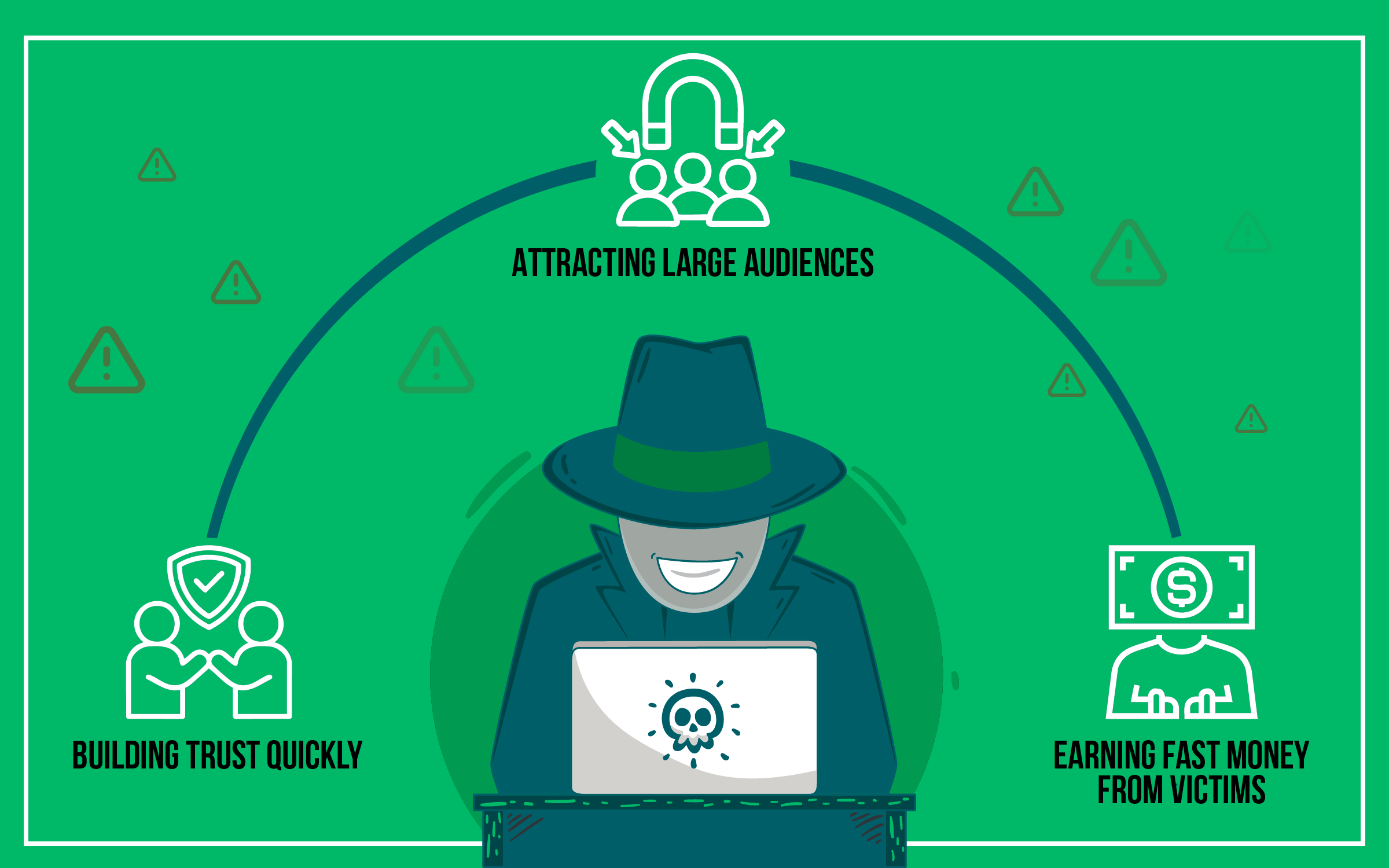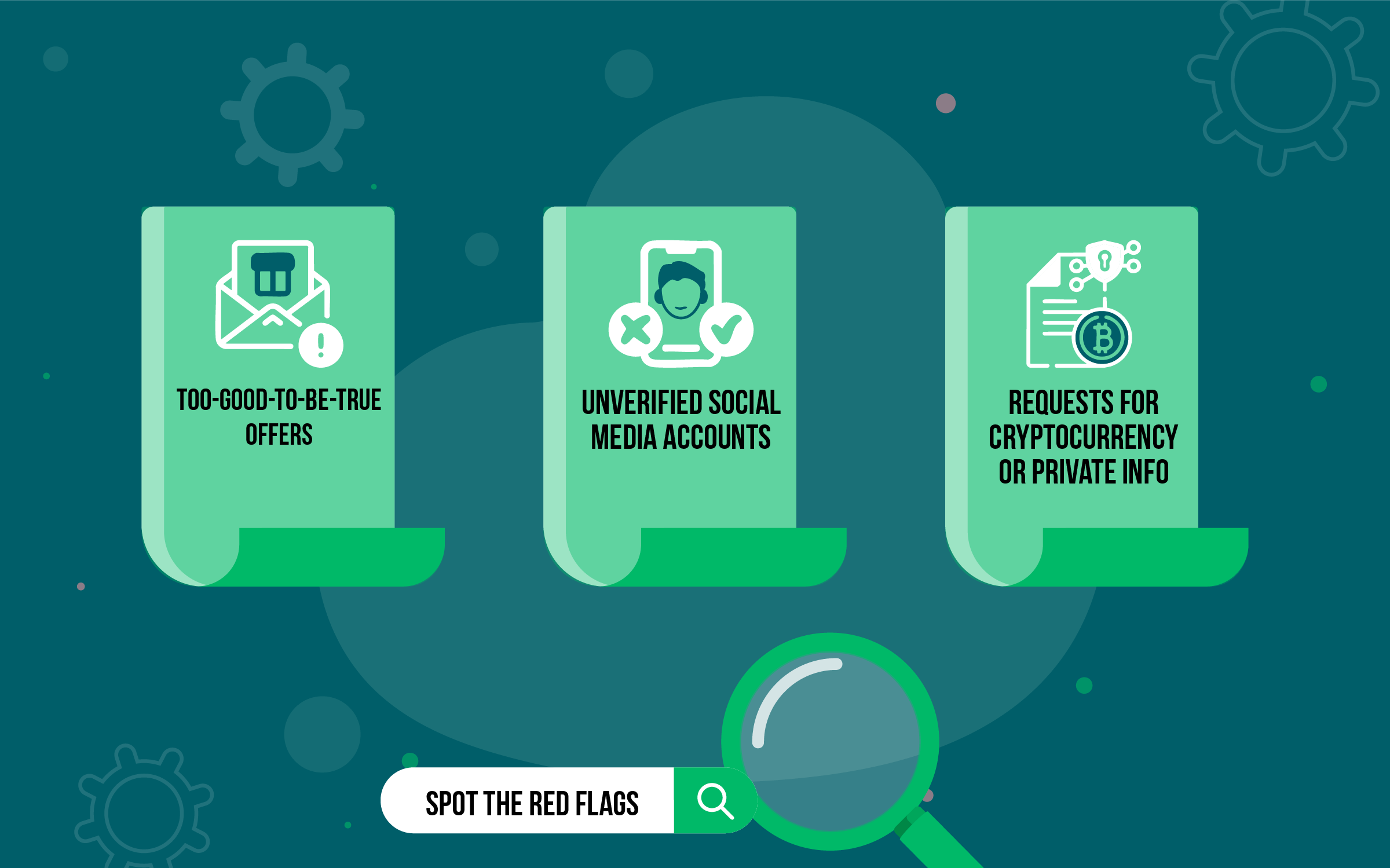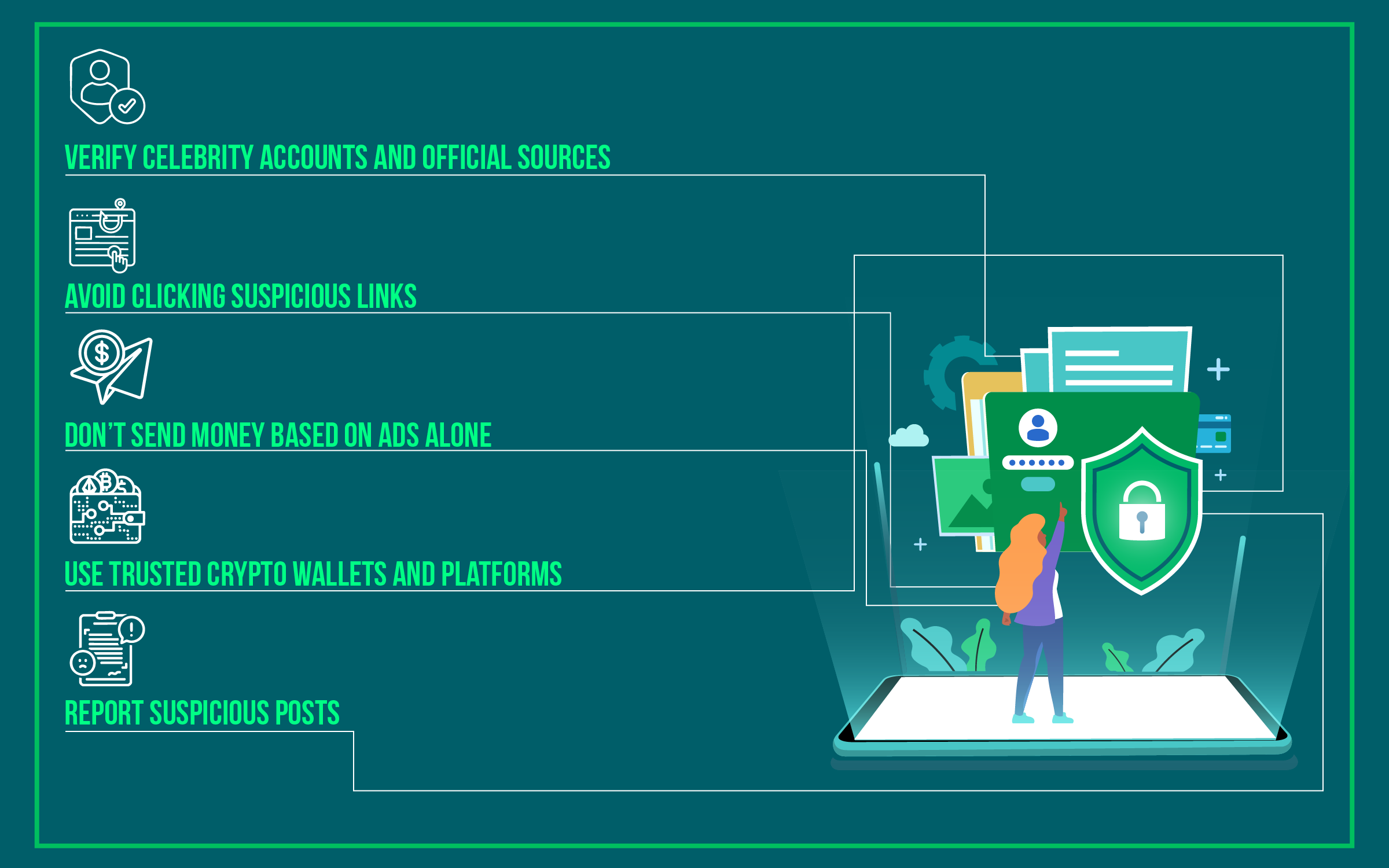
- Social Engineering
- July 8, 2025
These days, it’s easy to get pulled in by opportunities that promise quick money. With the rise of forex trading and cryptocurrency, millions are chasing the dream of financial freedom. But where there's buzz, scams often follow close behind, and one of the most convincing tricks out there is the use of fake celebrity endorsements.
These scams aren’t always loud or obvious. In fact, many of them look professional, the kind of thing you'd expect from a real company. That’s what makes them dangerous. People click, invest, and only realize something’s wrong after their money is gone, and the celebrity they trusted was never involved.
In this article, we’ll break down how these scams work, where they usually appear, and what you can do to avoid falling for them.
Why Scammers Love Famous Faces?

Scammers don’t always need to break into systems or write complex code. Sometimes, all it takes is a familiar face to make people drop their guard, and that’s exactly why fake celebrity endorsements work so well. A well-known personality instantly makes a product or service feel more legitimate, even if it isn’t.
When people see someone they recognize promoting an investment, they let their guard down. This is especially true if that person is seen as successful, wealthy, or tech-savvy. Scammers understand this psychology and use it to their advantage.
They also know that celebrities rarely respond to every misuse of their image. Legal action can take time, and by the time it happens, the scam has already moved on or changed names.
Where Fake Celebrity Endorsements Are Found Online
These scams aren’t hidden in dark corners of the web. They’re out in the open, often placed right in front of users through ads, pop-ups, or social media posts. Some even appear on mainstream websites through poorly vetted ad networks.
The most common places they show up:
1. Social Media Ads: Facebook, Instagram, YouTube, and TikTok are full of sponsored posts. Some appear to be news articles or interviews. Others are short videos showing a celebrity “explaining” an investment opportunity. These are often deep fakes or AI-generated content using real faces and voices.
2. Fake News Sites: Scammers create fake media websites that copy the look of trusted news outlets. Articles claim that a celebrity “revealed their secret to wealth” or “shared a new crypto project.” Everything from layout to logos is copied to appear legitimate.
3. Messaging Apps & Emails: People receive direct messages on Telegram, WhatsApp, or via email with links to “exclusive” platforms or limited-time offers. These often come with fake testimonials and screenshots of celebrity endorsements.
4. YouTube Comments and Channels: Some scammers flood video comment sections with fake offers, pretending to be the celebrity themselves or a close associate. Others run entire YouTube channels designed to look like they belong to a known public figure.
The Psychology Behind Why This Scam Works
There are a few psychological tricks that make these scams especially effective.
Familiarity: When people see a celebrity, they associate it with trust. They’ve seen this person on TV, in interviews, or in successful roles. That familiarity builds a false sense of security.
Urgency: Scammers almost always use time pressure. Messages like “only a few spots left” or “offer expires in 24 hours” push people to act before they think. Combined with the emotional boost from seeing a celebrity’s face, it becomes hard to resist.
Social Proof: Fake testimonials, screenshots of bank accounts, and edited video clips create the illusion that “everyone” is profiting. This builds FOMO (fear of missing out).
Authority Bias: People naturally assume others with fame and success know what they’re talking about. If someone like Bill Gates seems to be backing a new crypto platform, even if it’s not really him, it’s easy to think, “Well, if he’s involved, it must be legit.” That’s exactly what scammers count on.
All these little details the familiar face, the flashy promises, the sense of urgency, come together to create something that feels exciting and safe. But that’s the trap.
Who Gets Impersonated the Most and Why It Works
Not all celebrities are targeted equally; scammers tend to go after the big names, the ones with massive followings and a reputation for success. Because people naturally trust familiar faces, especially those who’ve built a name around money, tech, or influence. If a well-known figure appears to back an investment, it immediately feels more legitimate, even when it’s not.
Here are some of the most commonly impersonated names:
Elon Musk – Elon is one of the top targets when it comes to crypto-related scams. His known involvement with Bitcoin, Dogecoin, and his tweets about tech give scammers the perfect excuse to use his image. They’ll create fake platforms or announcements, making it look like Musk is behind the next big thing, and people buy in, thinking it’s the real deal. His reputation in tech makes it easier to fool investors who think he’s backing a legitimate project.
Bill Gates – Gates is often the face of fake investment schemes. His association with tech and philanthropy makes him a natural fit for scammers targeting people looking for safe, tech-related investments. Scammers love using his image because it gives their scams instant credibility.
Oprah Winfrey – Oprah has one of the most trusted names in media, and scammers take full advantage of this. They’ll use her to promote fake business or wellness opportunities, knowing her popularity will help lure people in. People trust her, which makes it easier to convince them to invest in something questionable.
Richard Branson – The Virgin Group founder is often linked to bogus startup funding or investment schemes. His name is used to make fake businesses or projects appear more legitimate. People are more likely to believe in something if a successful business mogul like Branson seems to be backing it.
And it’s not just the global superstars, local figures, or popular regional personalities who are often targeted, too. Scammers adjust their approach to fit the local culture or region, using figures people trust to make the scam seem closer to home.
The Role of AI in Making It Worse
AI is making scams more convincing than ever. What once might have been easy to spot has now become much trickier, and it’s all thanks to advancements in technology. Here’s how AI is being used to trick people:
Deepfake Videos: These aren’t the obvious, glitchy fakes people used to see a few years ago. With today’s AI, scammers can create videos that look and sound almost exactly like a real celebrity. It might show a well-known figure talking about a new investment platform, but the entire thing is fabricated. And because it looks polished and convincing, most people don’t think twice before clicking.
Voice Cloning: It’s not just the visuals; scammers can now clone voices too. So instead of a bad impression or robotic audio, you might hear something that sounds exactly like Elon Musk or Oprah pitching an opportunity. It’s strange, and it makes scams feel more personal and believable, especially if it comes through a voice note or an unexpected call.
Chatbots: Some scam websites now use AI chatbots to make interactions feel more real. You might land on a site and start chatting with what feels like a friendly support agent, but it’s not a person. It’s an AI script, designed to keep you engaged, answer just enough questions, and guide you deeper into the scam before you realize what’s happening.
Thanks to these AI tools, scammers have turned up the sophistication of their tricks. It’s no longer just about fake pictures or fake websites; now it’s video, voice, and real-time conversations. And that makes it harder for anyone to spot these scams before it’s too late.
Real Stories With Real Losses
These scams aren’t just stories you hear about; they’ve caused real damage to real people. When the scam looks legit, it’s easy to get fooled. Here are some examples that show how costly these fake celebrity endorsements can be.
UK Case: In 2021, a man in the UK came across a Facebook ad that showed what looked like an interview with Martin Lewis, a well-known financial advisor. The ad was slick and professional, so it seemed legit. Trusting it, he invested £30,000. Sadly, it turned out to be a scam. By the time he figured it out, the website had vanished and so had his money. It’s a clear example of how scammers use trusted names to trick people.
Australia Case: In 2020, an Australian retiree fell for a deepfake ad with Elon Musk promoting a "Tesla-backed" cryptocurrency platform. She was convinced that Musk’s involvement made the platform trustworthy, so she invested $70,000. Only after the platform disappeared and the website shut down did she realize she had been scammed.
Canada Case: In 2022, a man from Toronto lost over CAD 130,000 after seeing an investment ad on Instagram. It looked legitimate and included glowing testimonials supposedly from well-known Canadian public figures. He was persuaded to transfer money into what he thought was a trading account. But in reality, it was part of a carefully built scam, and the platform vanished soon after.
These aren’t rare, one-off incidents. They're part of a growing pattern. Victims are often left not only with financial losses but also emotional stress, and without many clear ways to recover what they’ve lost. Scammers move fast, and by the time people realize what happened, it’s often too late to act.
How to Spot a Fake Endorsement Before Its Too Late?

When it comes to celebrity endorsements, there are a few quick checks to avoid falling for scams:
1. Check the Source: Always verify if the celebrity has posted the endorsement on their official social media accounts or website. If you don’t find it on their verified profiles, the endorsement is likely fake. Celebrities rarely promote products outside their direct channels.
2. Look for Media Coverage: Real celebrity endorsements often make headlines in trusted news outlets. If you don’t find any coverage from well-known media platforms, it’s likely a scam. Reputable companies would also publicize partnerships widely.
3. Examine the Website: Take a good look at the website. Even if it looks polished, it could still be a scam. Watch out for bad grammar, broken links, or promises that sound too perfect to be true. These are classic warning signs.
4. Use Reverse Image Search: Try doing a reverse image search on Google with the celebrity’s photo. If you find the same picture popping up in multiple suspicious ads, that’s a strong hint the endorsement isn’t real.
5. Don’t Be Rushed: Don’t let anyone pressure you to act fast. Messages like “only a few spots left” or “act now” are red flags. Legitimate investments don’t force quick decisions or promise guaranteed returns.
6. Verify Through Trusted Sources: Check trusted sources for reviews or feedback before trusting celebrity-backed ads. If you find little information or scam warnings, it’s safer to avoid the offer.
7. Check Contact Details: Look for proper contact information on the website. If there’s only an email or no real customer support number, that’s a warning sign of a scam.
8. Watch Social Media Activity: Observe the celebrity's social media closely. If their posts seem unusual or the profile behaves differently than usual, be suspicious. Scammers often hijack or fake accounts.
How to Protect Yourself from These Scams?

When it comes to celebrity endorsements, there are a few quick checks to avoid falling for scams:
1. Look for Verified Accounts: Always check if the celebrity’s account is verified before trusting endorsements. Fake profiles can look real but won’t have the blue checkmark. When unsure, confirm via the celebrity’s official website.
2. Avoid Unrealistic Promises: Be skeptical of offers promising huge, guaranteed returns with no risk. Real investments always carry some level of risk.
3. Research the Platform: Do your homework. Look up reviews or other users' experiences. A lack of information or an unprofessional website is a red flag.
4. Take Your Time: Don't rush into decisions. Scammers create false urgency to push you. Real opportunities won't pressure you to decide on the spot.
5. Use Security Software: Install ad blockers or anti-scam browser extensions to help block suspicious links and harmful ads before they reach you.
6. Know What to Do if Scammed: If you’ve fallen victim, stop sending money immediately. Report the scam to the relevant platform or authorities. Recovery services, like Financial Recovery Experts, may help recover lost funds.
What Most Victims Dont Realize Until Its Too Late?
There’s one layer of the scam many people don’t know: it doesn’t always end after the first loss.
Once a scammer knows you’ve fallen for the trap, they often mark you as a "hot lead." Your contact details get shared or sold to other scam operations. Suddenly, you start getting more offers, more calls, and more "urgent opportunities." This is no accident; it’s part of a larger system.
Some victims even get contacted by fake “recovery agents” claiming they can help retrieve lost funds, for a fee. It’s a scam layered on top of another scam.
What starts as one fake ad can spiral into months of harassment, emotional stress, and more financial loss.
FAQs (Frequently Asked Questions)
Check if the endorsement appears on the celebrity’s official social media or website. If it’s missing from their verified accounts, it’s likely fake. Also, be cautious of ads that rush you to act or promise guaranteed returns — real investments don’t work that way.
Familiar faces create instant trust. People naturally believe a product or investment is real if a well-known person appears to back it. Scammers know this and exploit it to lower your guard and make their scams look legit.
Stop any further payments right away. Report the scam to the platform or local authorities. Acting fast can sometimes help limit losses. It’s also smart to warn others so they don’t fall into the same trap.
Always verify celebrity endorsements on official profiles. Take time to research any investment platform before putting money in. Don’t give in to pressure or quick deadlines. Using ad blockers and security software can also help keep scam ads away.
AI is used to create deepfake videos, voice cloning, and even AI-powered chatbots to make scams feel more personal and realistic. These tools allow scammers to impersonate celebrities with uncanny accuracy, making it harder to spot the fraud. The sophistication of AI has significantly raised the stakes, making it essential for people to stay vigilant and verify information before taking action.